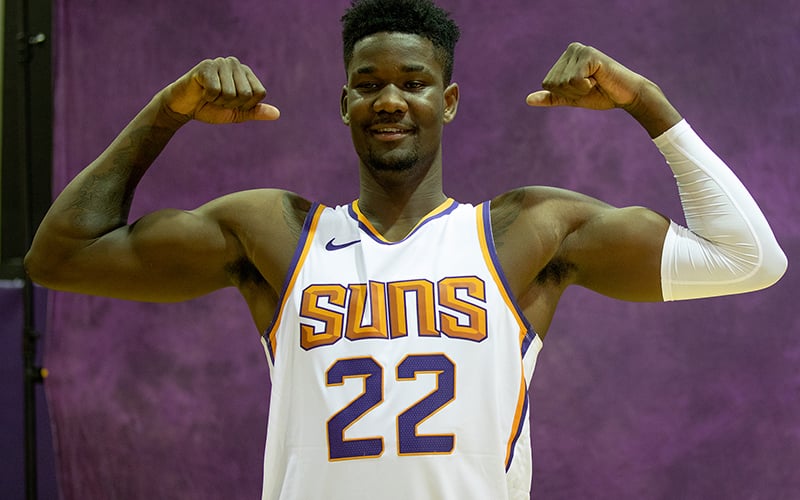
The Suns’ Deandre Ayton, who was suspended 25 games for violating the league’s anti-drug policy, said taking a banned diuretic was an “unintentional mistake.” (Photo by Justin Parham/Cronkite News)
PHOENIX – As shocking as the news that Deandre Ayton had tested positive for a banned substance was, what the NBA found in his system was equally surprising.
No trace of a performance-enhancing drug, which the New York Knicks’ Wilson Chandler was suspended for in August. Nothing like what was found in the system of Tyreke Evans, who was “dismissed and disqualified” from the NBA for two full years in May for violating the league’s anti-drug program.
Ayton’s drug test revealed a diuretic, according to the NBA, resulting in a suspension of 25 games.
The NBA lists 24 different drugs under the label “diuretics.” Often called water pills, diuretics increase the amount of water and salt expelled from the body as urine. They’re typically used to lower blood pressure, are known to help prevent or treat heart and liver failure, and can result in rapid weight loss.
But because they increase urination, they’re also ideal masking agents for other drugs. Other drugs like performance enhancers.
Someone like Ayton, given his age and body type, would have little need for a diuretic, said Siddhartha Angadi, a cardiovascular physiologist and a researcher at Arizona State University.
“In healthy people, there’s absolutely no reason why you should take them,” Angadi said. “They are powerful drugs that can have significant side effects.”
But Angadi did have a caveat. Ayton’s reasoning that he didn’t knowingly take a banned substance? It’s plausible.
“Long story short, the FDA wanted to regulate supplements back in the ‘90s,” he said. “The supplement industry mounted a vigorous campaign against it.”
That push led to the passing of the “Dietary Supplements and Health Education Act of 1994,” which Angadi said has had disastrous effects on the transparency of the supplement industry.
“Supplements are not supposed to contain drugs. But in reality, a substantial number of supplements are tainted by drugs,” Angadi said. “The biggest problem with the supplement industry is how poorly regulated it is and how little oversight there is.”
The exact diuretic hasn’t been disclosed, and can’t be unless approved by the NBPA or unless Ayton does himself. But he and the players association will have to convince a league grievance arbitrator that he “bears no significant fault or negligence” if he hopes to see the court before mid-December.
The World Anti-Doping Agency includes diuretics on its list of prohibited substances, and the NBA, along with the NFL and MLB, choose to treat them the same as a steroid or performance-enhancing drug violation.
Under the 2017 collective bargaining agreement between the league and the National Basketball Players Association, detection of a banned diuretic triggers a 25-game suspension for a first-time offender.
After the first 25-game punishment, a player is subject to a 55-game suspension. A third suspension and “the player shall be immediately dismissed and disqualified from any association with the NBA or any of its Teams,” per the CBA.
Suspension impact
This season was supposed to be a hopeful one for Phoenix. With a new coach and an influx of veteran players like Ricky Rubio and Aron Baynes, all the talk this offseason was about a more mature, professional Suns squad.
Ayton was talking changes, too. In a training camp interview earlier this month, the sophomore 7-footer was quick to say he was in the best shape of his life. That, of course, hits the ear a little different now.
?Best Shape of His Life Alert ?
DeAndre Ayton talking gains on the Suns’ first day of training camp: pic.twitter.com/57qgWFymJV
— tyler dunn (@itstylerdunn) October 1, 2019
Ayton had some of the best numbers of any rookie a season ago, finishing with 16.3 points and 10.3 rebounds per game. But he also struggled mightily with his interior defense, registering less than a block per game and one of the highest defensive field goal percentages of any starting center in the league.
Now he faces a new numbers problem: He stands to miss about 20 percent of the Suns’ season, costing him roughly $2 million, CNBC reported.
With Ayton out, the Suns are suddenly thin in the front court, even with the unexpected recent contributions of Frank Kaminsky. In a buzzsaw of a Western Conference, that’s not something the Suns, trying to improve on last year’s 19-63 record, can afford.
If Ayton’s suspension stands at 25 games, he won’t be able to return until a December 17 road matchup with the Los Angeles Clippers.
